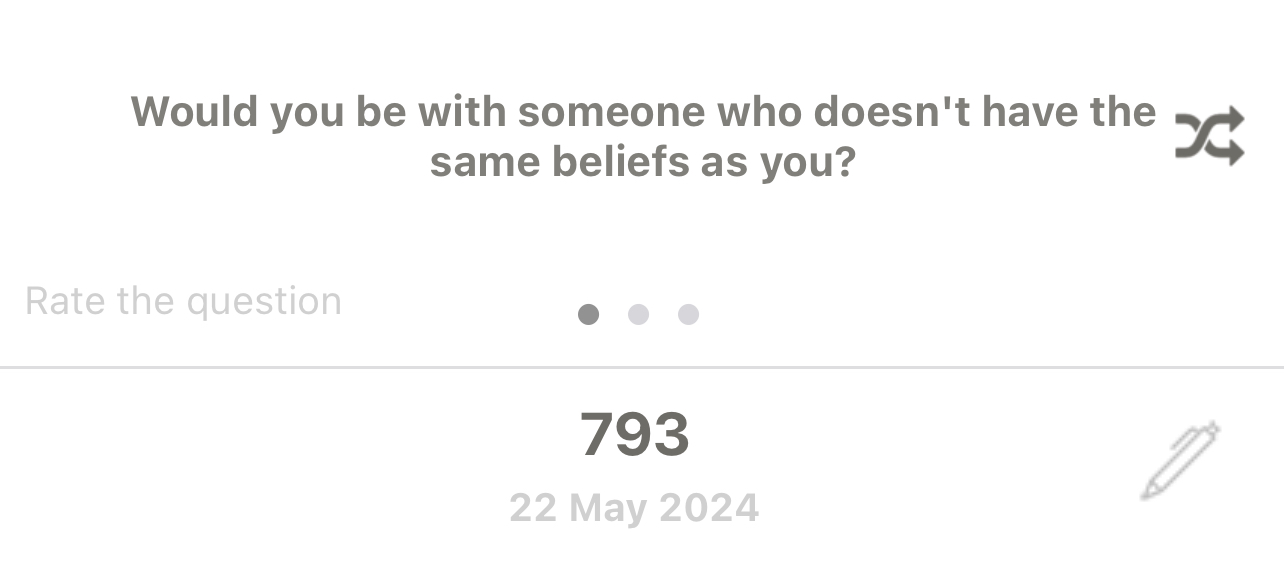
240522WED: Q793
Would you be with someone who doesn't have the same beliefs as you?
당신과 같은 신념을 가지고 있지 않은 사람과 함께 하시겠습니까?
Whether I would be with someone who holds different beliefs depends on the specific beliefs and how they affect our relationship.
제가 다른 신념을 가진 사람과 함께 할 것인지 여부는 구체적인 신념과 그 신념이 우리 관계에 어떤 영향을 미치는지에 달려 있습니다.
-
240522WED: Q793
Would you be with someone who doesn't have the same beliefs as you?
The question of whether to be with someone who holds different beliefs is a complex one, and my answer would largely depend on the context and specific circumstances involved.
Relationships are multifaceted, and the impact of differing beliefs can vary significantly depending on the nature of those beliefs and how central they are to each person's identity and daily life.
Firstly, it's important to consider what "being with someone" means in this context.
If we are talking about a deep, committed relationship, then the alignment of core beliefs and values often plays a crucial role in the stability and harmony of that relationship.
On the other hand, if the relationship is more casual or situational, such as a friendship or a professional partnership, differing beliefs might not be as critical and can even be enriching.
Beliefs can span a wide range of areas, including religion, politics, morality, lifestyle choices, and even preferences in art and culture.
The significance of these beliefs can also vary.
For instance, differing tastes in music or movies are usually minor issues that can be easily navigated.
However, conflicting beliefs about fundamental values, such as honesty, fidelity, and the importance of family, can pose serious challenges.
In some cases, differing beliefs might lead to hardships or discomfort.
For example, if two people have opposing political views, this could lead to frequent arguments or feelings of frustration.
Similarly, religious differences might create tension, especially if one person's faith practices are integral to their daily life and the other person does not share these practices.
These differences can sometimes feel insurmountable, leading to significant strain on the relationship.
I do recognize that there are some beliefs and values that are so central to a person's identity that differing on them might make a relationship untenable.
For instance, if one person strongly values having children and the other does not, this fundamental difference could lead to irreconcilable conflict.
Similarly, if one person holds deeply ingrained prejudices that the other finds morally unacceptable, this could create a barrier to a healthy relationship.
Ultimately, my willingness to be with someone who holds different beliefs would depend on the specific beliefs in question and how they impact our lives together.
If the differences are minor and do not interfere with mutual respect and shared goals, I would be more open to the relationship.
However, if the differences are fundamental and likely to cause ongoing conflict or undermine my core values, I would be more hesitant.
In conclusion, the question of whether to be with someone who has different beliefs does not have a one-size-fits-all answer.
It's a nuanced issue that requires careful consideration of the specific beliefs, the nature of the relationship, and the willingness of both individuals to navigate their differences with respect and understanding.
Words 464 of 43979
Characters 2966 of 265753
Characters excluding spaces 2523 of 225079
-
https://youtu.be/oG-Q3KdiiC0?si=WbuhyUqXP5TEnUvF
https://blog.naver.com/jesssjan/223373113742
오픈카톡 영어스터디 인원 모집
2021년부터 운영해온 카카오톡 오픈채팅 영어 스터디에서 같이 영어 공부하고 정보 교류하실 분들을 찾습니...
blog.naver.com
#매일영작, #영작연습, #영어일기, #매일영작스터디, #영어스터디
'3_____Writing Practice > Question Diary (2202-)' 카테고리의 다른 글
| Question Diary 240524FRI: Q795 (0) | 2024.05.24 |
|---|---|
| Question Diary 240523THU: Q794 (0) | 2024.05.24 |
| Question Diary 240521TUE: Q792 (0) | 2024.05.22 |
| Question Diary 240520MON: Q791 (0) | 2024.05.21 |
| Question Diary 240519SUN: Q790 (0) | 2024.05.20 |



